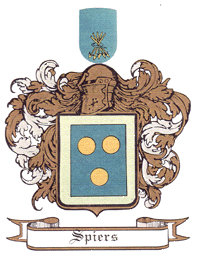
Major-General Sir Edward Louis Spears Bt, KBE, CB, MC – By Ron Spiers, Sept 2002
Almost any book on Sir Winston Churchill, the ex British Prime MInister and WW2 leader, mentions Spears. One would think that it was his real name, but in fact he was born as Spiers and later changed his name by Deed Poll to Spears.
Spiers’ connection with Churchill had started in WW1. Spiers was one of the few British Army Officers at the battle front in France who spoke fluent French. Consequently he was called upon to carry out liaison work between the British and the French battle commanders. When Churchill arrived at the battle front he was asked to do the same for him, Churchill’s French, so Winston thought was good, in fact it was poor.
How did these events come about?
Edward Louis Spiers was born at Passy, France in 1886 and was registered as a British subject. His father was Charles McCarthy Spiers, a railway engineer, who had married Marguerite Melicent Hack at the British Embassy church in Paris. He named his son Edward Louis after her father. Edward Louis Hack was also a railway engineer and he married Lucy Harriett Aymler who came from County Kildare in Ireland. The Hacks were protestants and had links with the Anglo-Irish upper classes, with estates, a castle, and a baronetcy in Donadea, Co. Kildare. Charles Spiers’ father was Alexander Spiers, a lexicographer and Professor at the Lycee Bonaparte in Paris who wrote an English-French Dictionary, spoke seven languages and was awarded the Legion of Honour. He was also a difficult man, at one stage suing his publishers for pirating his work. He lost the case.
Edward Louis Spiers, Louis as he was usually called, felt more for his grandmother, Lucy Hack who adored him, than his grandfather, Alexander, who he thought was as dry as dust. He also thought more of the Irish side of the family with its connections than he did the English side. His mother, Melicent, and his father were going through a difficult relationship. She sued her husband, Charles, in the French courts and the marriage was dissolved in 1905. Consequently Louis spent a lot of time with his grandmother, Lucy, often moving between Ireland and the haunts of the English in France, Aix-les-Bains, Menton and Switzerland. He also attended a school run by monks in Germany. In due course he joined the Army, which his father did not want him to do, so the relationship between father and son further deteriorated. Charles died soon afterwards. So at a young age he lost his father and this may have had an effect on his later life when he seemed to get on better with older men. Although his education was somewhat fractured his French language skills were improving with all these moves and he read a great deal, especially French poetry. He spoke with a French accent. This reading would stand him in good stead when he began to write his own books, his first being a translation of the French, Lessons of the Russo-Japanese War, while still a young subaltern. He wrote many more books, as Spears, and is regarded as one of the finest War historians.
When he had just turned sixteen he joined the 3rd Battalion of the Royal Dublin Fusiliers in Kildare and later became a second lieutenant. After passing his examinations for the regular Army he was posted to the 8th, the Royal Irish Hussars. He was commanded to work at the War Office on an Anglo-French Code book but that did not last long as the French were not keen to provide information. In May 1914 he was posted to Paris to work with the French and make contacts with British intelligence agents in Belgium. When the War commenced the English soldiers in France hardly spoke any French, and the French any English. Spiers came into his own and from then on he became the Liaison between them. He was wounded in action twice. When Winston Churchill arrived at the Front he noticed Spiers, took a liking to him and asked him to become his brigade major. From then on the two became great friends and Spiers continued his Liaison duties at the highest level, becoming a confidant of Churchill and acting as interpreter at many high powered meetings. He rose in rank, finally becoming a Major-General. In 1940 he was sent by Churchill to bring General de Gaulle to England, flying with him in some secrecy, thus enabling de Gaulle to set up the Free French movement. He was knighted and became a Baron, but as his only son had died before him the Baronetcy lapsed when Spiers died in 1974.
In 1918 he changed his name to Spears on the grounds that his name was always being mispronounced. He became a Member of Parliament in 1922. The truth about his name may lie in his past about which he was reticent. Louis Spiers always denied that his ancestors were Jewish. His grandfather was Alexander Spiers, whose father was Isaac Spiers who was probably from Frankfurt, Germany and his father was Phineas Moses Spiers, who lived in Gosport, Hampshire. Phineas’ denization records give his place of birth as France but he may have originated from Germany before that. He was Jewish.
References
The Picnic Basket, by Major-General Sir Edward Louis Spears, London 1967
Under Two Flags, by Max Egremont, London 1997

